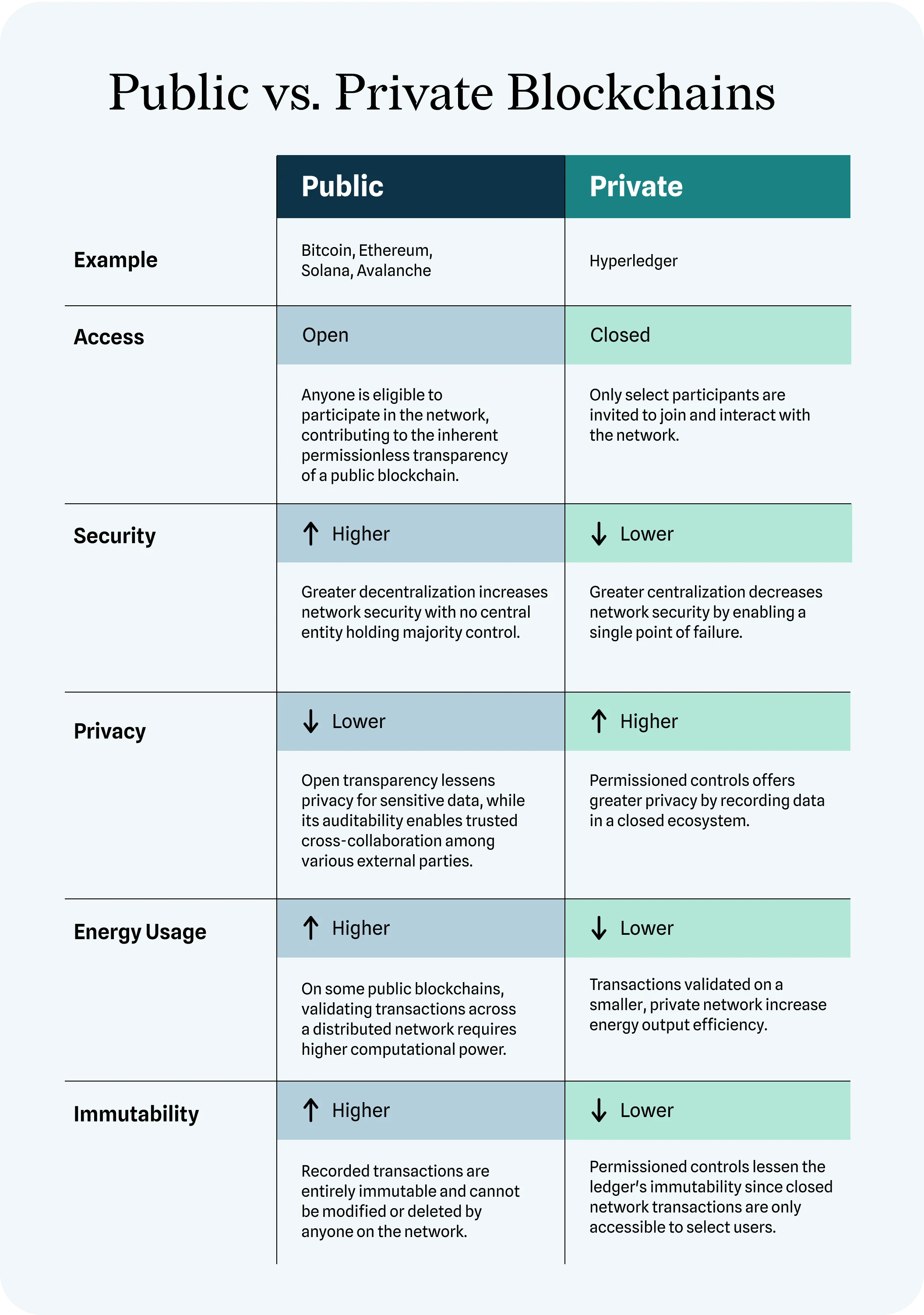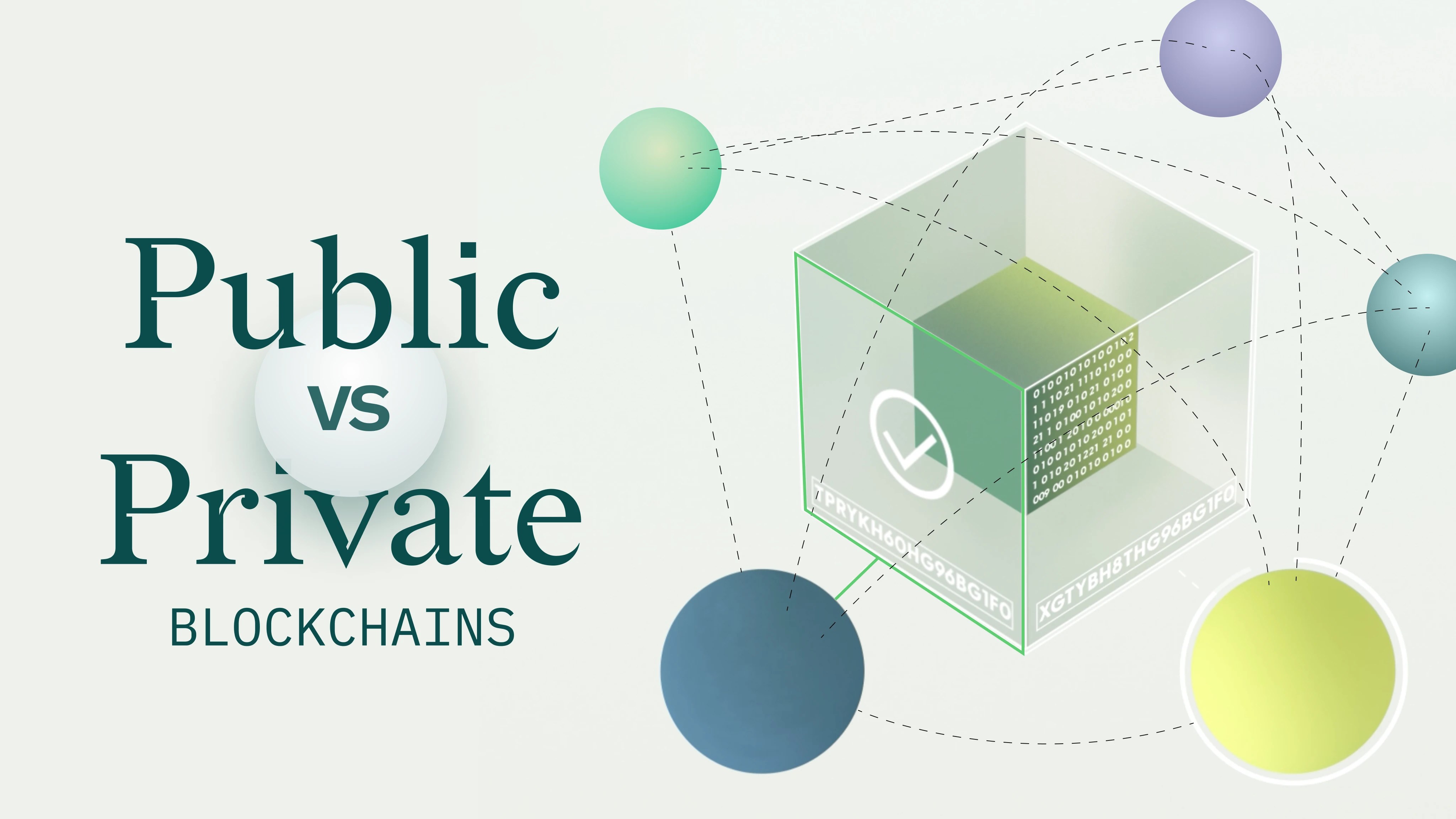Public and private networks enable individuals and organizations to harness the power of blockchain for their goals. In the following article, you will learn about the differences between public and private blockchains, use cases, and how organizations can best leverage each to support strategic goals.
Public Blockchain: Anyone can join, anyone can contribute
A public blockchain is a permissionless, non-restrictive decentralized digital ledger available to anyone for use. Data stored on the blockchain and a description of all transactions occurring are accessible to the public as part of a public blockchain.
Given the open nature of public blockchains, anyone can participate, commonly by performing transactions or by verifying transactions. As a public network, this type of blockchain maintains a greater degree of decentralization than private blockchains, making them more resistant to censorship and manipulation, while also removing any one central point of failure.
Computers on the network verify the integrity of transactions through consensus mechanisms. Common consensus mechanisms include proof of work, proof of stake, and proof of space and time. Public blockchains ensure greater confidence in their ledger by allowing public access to transaction records, enabling independent verification, and validating the overall integrity of the network.
Despite the security and auditability merits of public blockchains, some drawbacks remain – broadly distilled into scalability concerns, privacy challenges, and energy efficiency. Since public blockchains rely on consensus mechanisms to verify transactions, the processing time increases substantially as the number of transactions increases.Those seeking to utilize blockchain for storing sensitive data, such as financial information or medical records, may find the transparency of public blockchains to be a disadvantage. Lastly, using consensus mechanisms for verification significantly increases energy costs. As a result of the high energy demands, many have criticized public blockchains for their environmental impact.
Private Blockchain: Verified and Vetted
A private blockchain operates similarly to a public blockchain except, only select individuals can view and interact with a private blockchain. Each participant in the network must be authorized, and operates a node responsible for verifying and recording transactions on the digital ledger. Because access is limited to approved individuals, the transactions and data recorded by the blockchain are not publicly available, promising greater privacy compared to public blockchains.
Private blockchains also belong to a broader array of consensus mechanisms, allowing for many of the challenges associated with public blockchains, mainly scalability, and sustainability, to be circumvented. These consensus mechanisms are more tailorable than public blockchains, allowing for custom use cases rather than general applications.
Control over the number of individuals and the quality of nodes enables private blockchains to have faster processing speeds and improved scalability. As such, there are several key advantages of private blockchains for private entities, particularly, the enhanced privacy, improved control, and expedited processing times provide significant benefits for companies looking to leverage blockchain technology in their business. As with public blockchains, private networks are not immune to criticisms, mainly due to being far more centralized than public ecosystems. This centralization requires a significant amount of trust to be placed in the managing organization, while also limiting third-party verification of a ledger’s integrity.

Organizations Can Use Public and Private Blockchains for the Better
Public blockchains are best known for their role in cryptocurrencies. These open-source networks enable the execution of smart contracts, allowing a wide range of applications, including decentralized finance, decentralized exchanges, and crowdfunding.
The auditability and transparency of a public blockchain can be leveraged to create electronic voting systems. The immutability of blockchain records allows for expanded verification and security practices, improving current perceptions of the democratic process.
Public blockchains are best suited for use cases where auditability and trust are paramount and privacy is not a concern. Private blockchains are ideal when privacy is critical, such as storing confidential data or sensitive financial or medical information.
Private blockchains fit well at large organizations with the resources to operate several nodes for verifying their transactions. Specific use cases for private blockchains include supply chain management, international transactions, and healthcare data management. At Chia, our Virtual Private Blockchain maximizes the best of a public and private blockchain, offering organizations the security and decentralization of public blockchains without sacrificing the transaction speed or privacy typical of private networks. The Chia Virtual Private Blockchain enables organizations to reap the benefits of blockchain without sacrificing the privacy and control necessary for true enterprise-wide adoption.
FAQ
Q: What are the key differences between private and public blockchains?
A: A public blockchain is a permissionless, non-restrictive decentralized digital ledger available to anyone for use. On a private blockchain, only select individuals can view and interact with the network. Each participant in the network must be authorized, and operates a node responsible for verifying and recording transactions on the digital ledger.
Q: What are the advantages to both private and public blockchains?
A: Public blockchains offer greater decentralization, making them more resistant to censorship and manipulation, while also removing any one central point of failure. Additionally, public blockchains ensure greater confidence in their ledger by allowing public access to transaction records, enabling independent verification, and validating the overall integrity of the network. Private blockchains require authorization of users, limiting access and promising greater privacy. Control over the number of individuals and the quality of nodes enables private blockchains to have faster processing speeds and improved scalability.
Q: What are the disadvantages of both private and public blockchains?
A: Despite the security and auditability merits of public blockchains, some drawbacks remain – broadly distilled into scalability concerns, privacy challenges, and energy efficiency. The centralization of private blockchains requires a significant amount of trust to be placed in the managing organization, while also limiting third-party verification of a ledger’s integrity.
Q: How are public blockchains used?
A: Public blockchains are best suited for use cases where auditability and trust are paramount and privacy is not a concern. They are best known for their role in cryptocurrencies, enabling the execution of smart contracts, allowing a wide range of applications, including decentralized finance, decentralized exchanges, and crowdfunding.
Q: How are private blockchains used?
A: Private blockchains are ideal when privacy is critical, such as storing confidential data or sensitive financial or medical information. Private blockchains fit well at large organizations with the resources to operate several nodes for verifying their transactions with specific use cases in supply chain management, international transactions, and healthcare data management.






